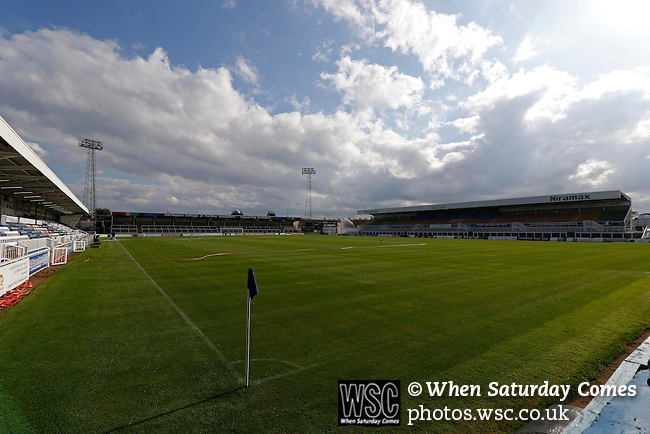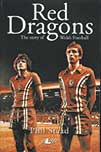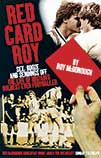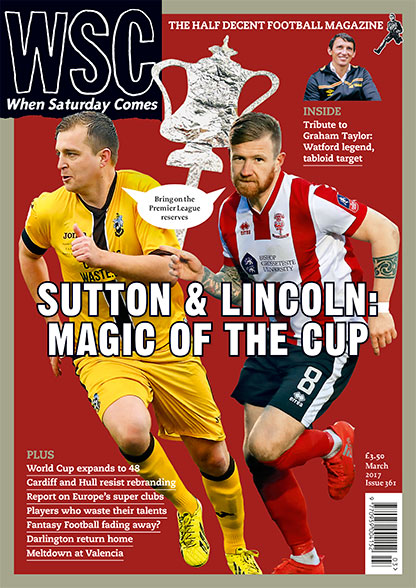Search: 'Newport County'
Stories

With a drop to the National League looming and no chairman, the only silver lining for the club are currently Hartlepool United Supporters Trust
 The story of Welsh football
The story of Welsh football
by Phil Stead
Y Lolfa, £14.95
Reviewed by Huw Richards
From WSC 319 September 2013
The condition of Welsh football is often serious but never dull, and the same can be said of Phil Stead’s engagingly readable chronicle. It is history as one thing after another, stronger on anecdote than analysis. The prose is more solid than stylish but with flourishes such as the characterisation of Jerry Sherman, briefly and disastrously Newport County’s owner, as having “the shifty-eyed evasiveness of a potion seller at a wild west show”.
Clubs are not neglected. We learn how Wrexham got their “Robins” nickname, that Cardiff possibly sacrificed the 1924 League title to Wales call-ups and that West Ham’s “Bubbles” anthem may have been borrowed from Swansea – but this is essentially the story of the Wales team and the Football Association of Wales (FAW).
The anecdotal style works well in the early years. It introduces debonair goalkeeper Leigh Roose, who dated music hall star Marie Lloyd and conceded a Scottish winner because he was talking to a spectator, and an earlier keeper who played against England with his forearms in plaster. There are two one-armed players, a schoolmaster accidentally shot dead by a pupil and evidence of the national surname shortage, with different players called Oswald Davies on consecutive pages. One FAW secretary is imprisoned for forgery and its second president is sacked for providing insufficient support – he was the nephew of the MP and magistrate who became founding president after licensing a pub lock-in at the first meeting.
Running themes do emerge. The FAW are perennially skint, so opt for income over team priorities in locating key qualifiers. They are beset by English club obstructionism over player release, localised factionalism – Oswestry v Wrexham prefiguring Swansea v Cardiff – and they treat Llanelli’s ambitions as unsympathetically in 1958 as in 2013.
They are baffled by foreign travel. Players routinely forget passports and it is hard to forgive the official who could have averted Vinnie Jones’s Wales debut, but let him play with limited documentation. The infamous incident when player Gil Reece was bumped from a flight packed with committee men is merely the culmination of traditions exemplified by taking only 18 players, but 25 officials including the FAW secretary’s sister, to the 1958 World Cup. And then there are the qualification near-misses, that litany of dodgy Scottish penalties and doped-up Russians for which the sad but inescapable explanation is that even good Wales teams are usually not quite good enough.
Red Dragons really should have an index but there are few factual glitches. Stead elevates Wrexham to Division Two 45 years too early, while the Trevor Ford who gave vital evidence at the manslaughter trial after a South Wales Transport player died on the pitch in 1934 was almost certainly not the rumbustious centre-forward, ten at the time, but his father.
But these are minor quibbles. Stead doubtless once dreamed of playing for Wales, but with this book serves his nation better than many who achieved that ambition.
 Sex, booze and sendings off: The life of Britain’s wildest footballer
Sex, booze and sendings off: The life of Britain’s wildest footballer
by Roy McDonough with Bernie Friend
Vision Sports, £12.99
Reviewed by Tom Lines
From WSC 309 November 2012
The football hard man is still a familiar figure, even if he is receding increasingly quickly into the game’s recent past. Popular culture tends to remember those who played at the highest level, where violent tackles and unsavoury moustaches were brought to a national television audience. For every Graeme Souness or Tommy Smith there were less well-known contemporaries in the the lower leagues. One such player was Roy McDonough, who accumulated a British record 22 early baths.
Apparently assembled from a bin of spare “Soccer’s Hard Men” tropes (the mullet and tache, the drinking and womanising, the failed marriage, the distant father he’s desperate to impress) McDonough is such an unrelenting stereotype that the obligatory career photos have presumably been included to reassure readers that they are not the victims of an elaborate spoof. Driven by limitless quantities of self-belief and an almost psychotic relish for physical confrontation, McDonough played just two first-team games during unhappy spells as a centre-forward at Aston Villa, Birmingham City and Chelsea. At the age of 22 he claims to have made a conscious decision to cruise through lower-league football as a way of funding his fondness for nightclubs.
A man who once promised a horrified physio that he would cut down to “just” 70 pints a week should be heading for a spectacular fall but it is the tragic suicide of Colchester team-mate John Lyons that, briefly, throws the boozing and one-night stands into stark relief. Alcohol permeates almost every page of this book but alcoholism is mentioned only once – when McDonough categorically rejects it as a description of his own drinking.
He is more honest in recounting the football side of his career, with team-mates, opponents, referees, supporters, managers and boardroom “suits” all subjected to withering assessments. There’s also a refreshing lack of dressing room omerta. It’s doubtful that Mark Kinsella will thank him for revealing a teenage fling with his landlady, though McDonough stops short of naming the team-mate who goaded Ian Holloway on the pitch by insulting his cancer-stricken wife.
He’s generous to those he respects too, without ever allowing it to affect his behaviour during a game. He idolises Southend boss Bobby Moore and when the manager gets wind of an unsettled score with Newport County’s Tony Pulis he pleads with McDonough not to let the team down. He is duly sent off after just seven minutes following a self-confessed attempt to decapitate the future Stoke manager.
Ghostwriter Bernie Friend has a great eye for period detail (there has surely never been a more evocatively named central-defensive partnership than Peterborough’s Neil Firm and Trevor Slack) and there are hilarious insights into some of the more eccentric characters of the era: Exeter boss Jim Iley’s fondness for games of hide and seek during training, for instance. In describing McDonough’s nocturnal activities the book occasionally slips into the kind of graphic detail that wouldn’t be out of place on the top shelf of a backstreet 1980s newsagent but this is still a fascinating voyage through a career described as “a violent trawl through the rough seas of the lower divisions”.
